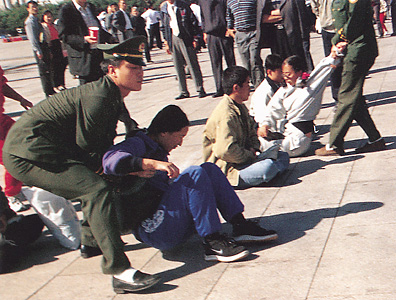Falun Gong is a system of spiritual cultivation (development) that emerged in China during the early 1990’s. Falun Gong teaches techniques of meditation through exercises as a means of gaining improved physical health and moral and spiritual purity. Falun Gong is Chinese for turn the wheel of law. Falun Gong is also called Falun Dafa, which means the dharma wheel of the great law. Dharma is the moral and religious law of Buddhism and Hinduism. Practitioners of Falun Gong claim there are more than 100 million followers in dozens of countries. But scholars doubt that the movement actually is that large.

Falun Gong followers state that the movement aims to promote truth, tolerance, and compassion—universal virtues that cross cultural, national, and racial boundaries. Those who practice Falun Gong seek to experience higher dimensions of consciousness and reach spiritual enlightenment.
Falun Gong was invented by Li Hongzhi, a teacher of traditional Chinese physical and mental exercise techniques. Li claims to have studied traditional Chinese forms of spiritual development with a succession of enlightened masters. Li created Falun Gong from their teachings. Falun Gong also contains elements drawn from the philosophies of Buddhism, Confucianism, and Taoism.
In 1992, Li Hongzhi introduced Falun Gong to a group of spiritual seekers. It soon grew into a movement that became popular throughout China. Li completed the system’s main book of teachings, Zhuan Falun, in 1994. In addition to describing the principles of Falun Gong, the book provides new views on evolution, the meaning of space and time, and the mysteries of the universe.
Followers of Falun Gong perform open-air exercises designed to promote good health by harnessing and controlling a spiritual energy called qi << chee >> . They follow the teachings of Li Hongzhi as published in Zhuan Falun and other books, as well as in audio-visual materials and on the Internet. In his role as a spiritual master, Li claims to insert an invisible “spiritual wheel” into his followers’ stomachs, thus filling them with spiritual energy and power and giving them perfect health.
In 1996, Li left China to promote Falun Gong in Europe, Asia, and Australia. In 1998, he moved to New York City, which became the headquarters of the movement.
Practitioners of Falun Gong state that it is not a religion and has nothing to do with politics. They say that believers are not required to give up material possessions, work, or family life. However, China’s government views Falun Gong as dangerous. The government claims that some practitioners have rejected modern medical treatments for serious diseases. Followers of Falun Gong deny this claim.
In 1996, the Chinese government stripped Falun Gong of its legal status and protection and banned its publications. On April 25, 1999, a crowd of about 10,000 Falun Gong followers carried out a daylong peaceful demonstration outside the central government buildings in Beijing. The government responded on July 22, 1999, with a total ban on Falun Gong in China. It also issued an international warrant for the arrest of Li Hongzhi and began a nationwide crackdown on the movement. Thousands of Falun Gong followers were jailed and “reeducated.” Many international human rights groups have expressed concern about the Chinese government’s suppression of Falun Gong. They also have objected to China’s harsh treatment of the movement’s followers.
